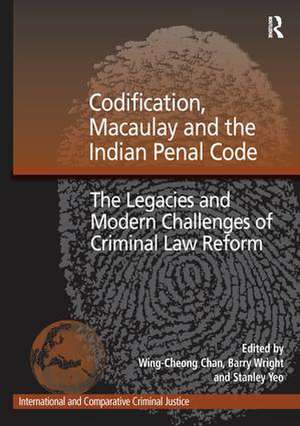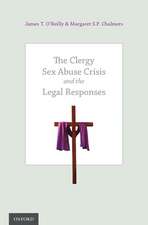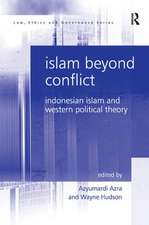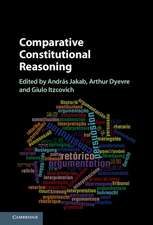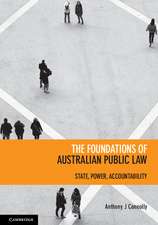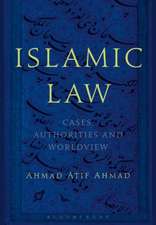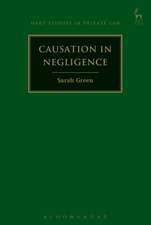Codification, Macaulay and the Indian Penal Code: The Legacies and Modern Challenges of Criminal Law Reform: International and Comparative Criminal Justice
Autor Barry Wright Editat de Wing-Cheong Chanen Limba Engleză Paperback – 19 oct 2016
| Toate formatele și edițiile | Preț | Express |
|---|---|---|
| Paperback (1) | 338.33 lei 6-8 săpt. | |
| Taylor & Francis – 19 oct 2016 | 338.33 lei 6-8 săpt. | |
| Hardback (1) | 855.76 lei 6-8 săpt. | |
| Taylor & Francis – 20 iul 2011 | 855.76 lei 6-8 săpt. |
Preț: 338.33 lei
Preț vechi: 386.77 lei
-13% Nou
Puncte Express: 507
Preț estimativ în valută:
64.74€ • 67.59$ • 53.58£
64.74€ • 67.59$ • 53.58£
Carte tipărită la comandă
Livrare economică 04-18 aprilie
Preluare comenzi: 021 569.72.76
Specificații
ISBN-13: 9781138255890
ISBN-10: 1138255890
Pagini: 396
Dimensiuni: 174 x 246 x 30 mm
Greutate: 0.45 kg
Ediția:1
Editura: Taylor & Francis
Colecția Routledge
Seria International and Comparative Criminal Justice
Locul publicării:Oxford, United Kingdom
ISBN-10: 1138255890
Pagini: 396
Dimensiuni: 174 x 246 x 30 mm
Greutate: 0.45 kg
Ediția:1
Editura: Taylor & Francis
Colecția Routledge
Seria International and Comparative Criminal Justice
Locul publicării:Oxford, United Kingdom
Cuprins
Contents: Preface; Part I Background and Overview: Revitalising Macaulay's Indian penal code, Stanley Yeo and Barry Wright; Macaulay's Indian penal code: historical context and originating principles, Barry Wright. Part II Principles of Culpability: The fault elements of offences, Neil Morgan; The conduct element of offences, Bob Sullivan; Mistake and strict liability, Kumaralingam Amirthalingam; Abetment, criminal conspiracy and attempt, Wing-Cheong Chan; Vicarious liability, Michael Hor. Part III Principles of Exculpation: Private defence, Cheah Wui Ling; Duress and necessity, Stanley Yeo; Insanity, Gerry Ferguson; Intoxication, Gerry Ferguson; Provocation, Ian Leader-Elliott. Part IV Challenges of Codification and Criminal Law Reform: An evaluation of judicial interpretations of the Australian model criminal code, Matthew Goode; Recent law reform and codification of the general principles of criminal law in England and Wales: a tale of woe, Chris Clarkson; Principled criminal law reform: could Macaulay survive the age of governing through crime? Reflections from the floor, Mark Findlay; Index.
Notă biografică
Wing-Cheong Chan is an associate professor of law and Amaladass Fellow for Criminal Law at the National University of Singapore. He specialises in criminal law and family law, and has written extensively in these areas. He is co-author (with Neil Morgan and Stanley Yeo) of Criminal Law in Malaysia and Singapore (LexisNexis, 2007), and has edited two books on criminal law: Fundamental Principles of Criminal Law: Cases and Materials (LexisNexis, 2005); and Support for Victims of Crime in Asia (Routledge, 2007). Barry Wright is a professor of law, history, and criminology at Carleton University, Canada. He specializes in legal history, criminal and constitutional law, and legal and political theory. He has published widely on colonial legal history, focusing on Canadian and Australian comparisons, and is editor of a multi-volume collaborative project, Canadian State Trials, that examines political trials and the administration of national security measures in Canadian history (University of Toronto Press-Volume One, 1608-1837 published 1996; Volume Two, 1837-39 published 2002; Volume Three, 1840-1914 published 2009). He is co-author (with Patrick Fitzgerald and Vincent Kazmierski) of Looking at Law: Canada's Legal System 6th edition (LexisNexis-Butterworths, 2010). Stanley Yeo is a professor of law at the National University of Singapore. He is an internationally renowned comparative law scholar who has studied the criminal laws of various jurisdictions for more than twenty years. He has authored several books on criminal law including Criminal Law in Malaysia and Singapore (with Wing-Cheong Chan and Neil Morgan); Fault in Homicide (Federation Press, 1996 - a treatise on culpable homicide in Australia, England and India); and Unrestrained Killings and the Law (Oxford University Press, Delhi, 1998 - a treatise on provocation and exceeding private defence in Australia, England and India). He has also been a regular contributor of articles to the Journal of the Indian Law Institute, the premier Indian legal journal.
Recenzii
'Criminal jurists and legal historians are indebted to the editors of this splendid, stimulating collection devoted to exploring Macaulay's Indian Penal Code. Spanning a diverse range of fundamental issues generated by the Code's historical context, structure and substance, this is the first full-scale assessment of Macaulay's bold Victorian venture in criminal law codification.' K.J.M. Smith, Cardiff University, UK 'Through this unique and quite exceptional set of essays, a fulsome tribute is paid to the work of arguably the most imaginative and gifted codifier of the criminal law to have worked in the English language. One hundred and fifty years on from the enactment of the Macaulay-inspired Indian Penal Code, leading scholars have now been brought together to build on Macaulay's foundations by providing fresh insights into the prospects for codification of the criminal law world-wide. These insights will appeal to readers across all common law jurisdictions, and beyond, who will find no stone unturned in this comprehensive examination of criminal law's history, its doctrines, and its theory.' Jeremy Horder, King's College London, UK ’All in all, Codification, Macaulay and the Indian Penal Code is requisite literature for those interested in re-evaluating criminal law that is based on the IPC. The ball has now moved out of the court of academics.’ Singapore Journal of Legal Studies '...this deeply learned collection of essays, written by and largely for legal scholars...' Victorian Studies 'The volume is a welcome addition to the current debate on the need for codification of law and the possible forms that it can take, especially since it highlights the deeply intertwined nature of codification in commonwealth countries. Thirteen authors from all over the world have not only scrutinised the content of the IPC and its legacy, they have also provided invaluable suggestions to update the IPC and restore its vitality.' International Journal for the Semiotic
Descriere
To mark the one hundred and fiftieth anniversary of the Indian Penal Code, sixteen international experts were invited to discuss its legacy within the common law world. This resulting book comprises not only a description of the general principles found in the IPC, but a consideration of modern views and developments on those principles and related doctrinal issues, and proposals for reforming the IPC in the light of those views and developments and within the spirit of Macaulay's original draft code.
